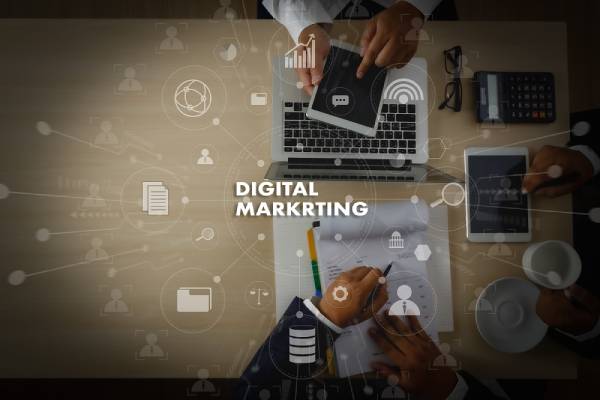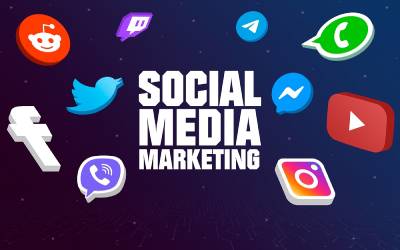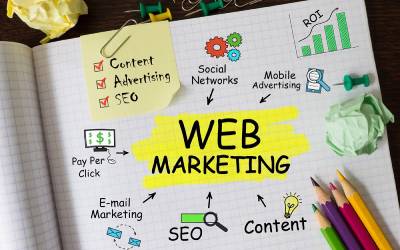
In today’s fast-paced, technology-driven world, digital marketing has emerged as an important segment of any successful business strategy. Whether you’re a seasoned entrepreneur or just beginning, understanding digital marketing is important to staying competitive and reaching your target audience effectively. It encompasses a wide range of online marketing techniques aimed at promoting products, services, or brands using digital media. This comprehensive guide will delve into the fundamentals of digital marketing, its key features, and how businesses can leverage it to achieve their goals.
Unique System Skills provides the best Digital Marketing Courses in Massachusetts and New Hampshire.

What is digital marketing?
Digital marketing refers to the promotion of products or services using different electronic devices and online platforms. Unlike traditional marketing techniques that rely on print media or television, digital marketing employs the vast reach of the internet to connect with potential customers worldwide. This form of marketing has become increasingly popular due to its cost-effectiveness, measurable results, and the ability to target distinct audiences.
Key Takeaways:
- Digital marketing contains marketing strategies strived at reaching customers through digital channels like websites, mobile devices, and social media platforms.
- It varies from internet marketing, which is limited to website-based marketing.
- Digital marketing involves different techniques such as email marketing, content marketing, search platforms, and social media marketing, among others.
- A significant challenge for digital marketers is standing out in a highly competitive landscape filled with digital marketing ads.
- Digital marketing also faces various challenges, including addressing implicit bias in advertising and audience targeting.
Types of digital marketing:
Digital marketing contains various types of strategies and channels that businesses and marketers can use to advertise their products and services online. Here are some of the most common types of digital marketing:
Search Engine Optimization (SEO): Search Engine Optimization is the method of optimizing a website’s content and structure to improve its visibility and ranking in search engine results pages (SERPs). By incorporating relevant keywords, creating high-quality content, and obtaining backlinks, businesses can increase their website’s organic traffic and rankings. The goal is to grow organic (non-paid) traffic from search engines like Google, Bing, and others.


Search Engine Marketing (SEM): Search Engine Marketing (SEM) is a digital marketing strategy that focuses on promoting websites by improving their visibility in search engine results pages (SERPs) through paid advertising. Unlike Search Engine Optimization (SEO), which strives to improve organic rankings, SEM involves paying search engines for ad posts to drive traffic and increase brand exposure. SEM is also commonly referred to as paid search advertisement or pay-per-click (PPC) advertising.
Content Marketing: Content marketing is a strategic marketing technique that focuses on creating and distributing valuable, appropriate, and consistent content to attract and engage a specific target audience. The primary goal of content marketing is not to directly advertise a product or service but rather to create trust, establish authority, and foster long-term relationships with potential and existing consumers.


Social Media Marketing: Leveraging social media platforms e.g., Facebook, Instagram, Twitter, and LinkedIn to build a brand presence, engage with the audience, and promote products or services. It involves both organic posting and paid advertising.
Email Marketing: Email marketing involves sending targeted emails to potential or existing consumers to nurture relationships, promote products or services, and drive conversions. Making a responsive email list and sending personalized content can significantly increase engagement and sales.


Website Marketing: Creating and optimizing a website to attract and convert visitors into consumers. This involves search engine optimization (SEO) to improve organic search rankings and user experience optimization.
Video marketing: Video marketing is a digital marketing method that involves using videos to broadcast products, services, brands, or ideas. It is a strong and effective way to engage with audiences, as videos have the ability to share information, emotions, and stories more vividly than text or images alone. Video marketing leverages the favor of online video platforms and social media to reach a wide audience and deliver effective messages.


Pay-Per-Click Advertising (PPC): Pay-Per-Click Advertising (PPC) is a famous digital marketing model that permits advertisers to show their ads on various online platforms and pay only when users click on these ads. It is a cost-effective and performance-driven promotion approach that enables businesses to target their desired audience virtually and measure the success of their campaigns in real time. PPC ads seem on search engine results pages (such as Google) or on different websites and social media platforms, and they are usually labeled as “sponsored” or “ad.” It commonly includes search engine advertising (like Google Ads) and social media promotion (like Facebook Ads).
Developing a Digital Marketing Strategy:
To make the most of digital marketing, companies should develop a well-structured strategy. Here are the key steps to creating an adequate digital marketing plan:
- Set Clear Objectives: Restrict your goals and objectives. What do you want to execute with your digital marketing efforts? Whether it’s growing website traffic, generating leads, driving sales, or enhancing brand awareness, your objectives will guide the rest of your strategy.
- Identify Target Audience: Understanding your target audience is vital for tailoring your marketing messages and choosing the most appropriate channels to reach them.
- Choose the Right Channels: Select the digital marketing channels that align with your purposes and audience preferences. A combination of SEO, content marketing, social media, and email marketing usually works well, but the mix will depend on your specific goals.
- Create Engaging Content: Create high-quality and effective content that resonates with your audience. Useful content builds trust and authority, encouraging users to engage with your brand.
- Implement and Monitor: Execute your digital marketing strategy and closely monitor its performance. Use analytics tools to measure the success of your campaigns and make data-driven adjustments as required.
- Optimize and Improve: Continuously optimize your techniques based on performance data. Digital marketing is dynamic, and staying adjustable will help you stay ahead of the competition.
- Conduct a Competitor Analysis: Research your competitors’ digital marketing techniques to determine their strengths and weaknesses. This analysis will give you wisdom into what works in your industry and where you can distinguish yourself.
Benefits of Digital Marketing:
Digital marketing offers a plethora of benefits to businesses and people looking to grow their online presence and achieve their marketing goals. Here are some of the common benefits of digital marketing:
- Global Reach: With the internet’s across-the-board accessibility, digital marketing allows businesses to reach a global audience. It breaks down geographical barriers, allowing even small businesses to compete on an international scale.
- Cost-Effectiveness: Compared to traditional marketing, digital marketing generally offers a higher return on investment (ROI) and can be more reasonable for businesses of all sizes.
- Targeted Advertising: Digital marketing allows specific audience targeting, reaching the right individuals at the right time, and improving the likelihood of conversions.
- Measurable Results: With digital marketing tools, businesses can track and study their campaigns’ performance in real-time, allowing for data-driven decision-making.
- Increased Engagement: Through social media and interactive content, digital marketing enables greater engagement and brand loyalty among consumers.
- 24/7 Availability: Unlike traditional marketing, which is tied to time constraints, digital marketing campaigns are accessible 24/7. Customers can access knowledge, make purchases, or interact with a brand at their convenience, improving the likelihood of conversions.
How Can I Become a Digital Marketer?
To become a digital marketer, follow these efforts:
- Develop Essential Skills: Digital marketers should have powerful writing abilities, proficiency in data analytics, and social media skills. Enhance these skills through practice and online resources.
- Pursue a Bachelor’s Degree: Most digital marketing positions need a bachelor’s degree. Choose a degree in marketing, business, or a related field like communications.
- Consider Digital Marketing Courses: Increase your formal education with digital marketing courses or boot camps. These programs provide valuable knowledge and insights into the latest marketing trends.
- Gain Practical Experience: Completing internships while in school can be helpful in gaining hands-on experience and making your professional network.
- Consider a Master’s Degree (Optional): While not required for entry-level jobs, a master’s degree in digital marketing can provide a competitive edge and advanced expertise.
Remember, the key to success in digital marketing is staying updated with industry trends, constantly improving your skills, and living proactively in achieving practical experience. With dedication and a strong basis, you can succeed in the dynamic world of digital marketing.
